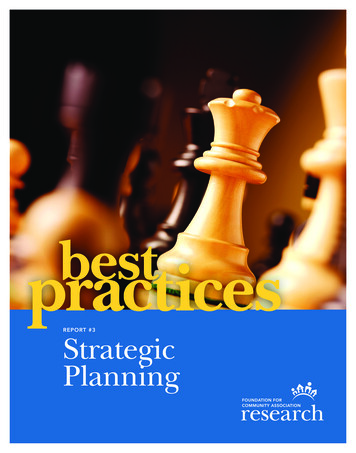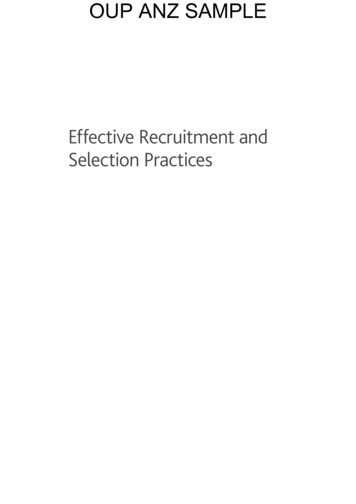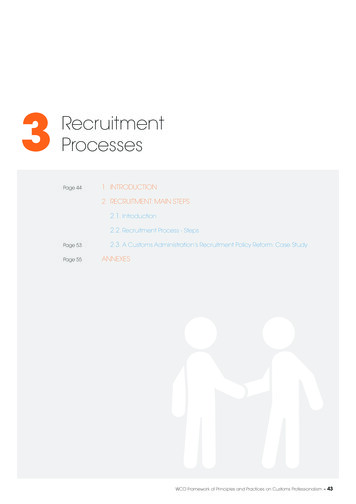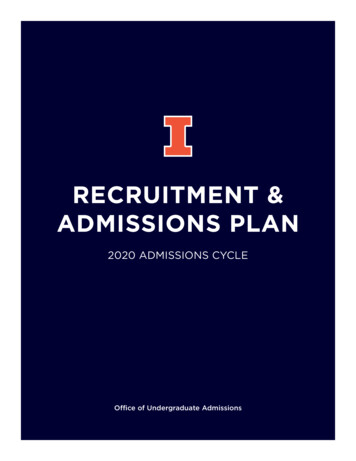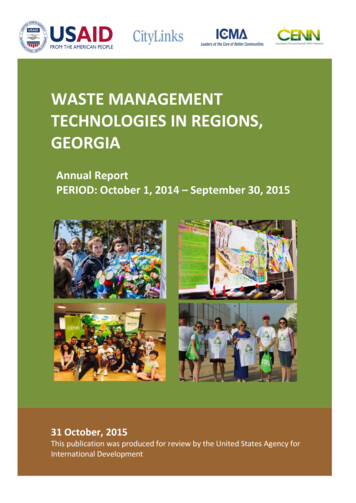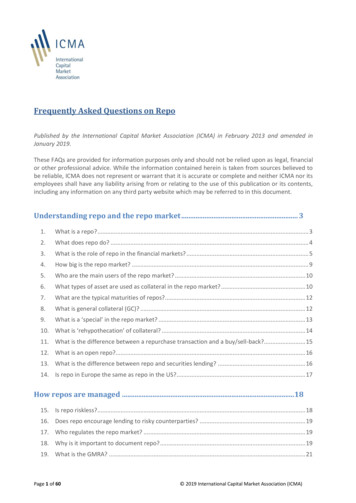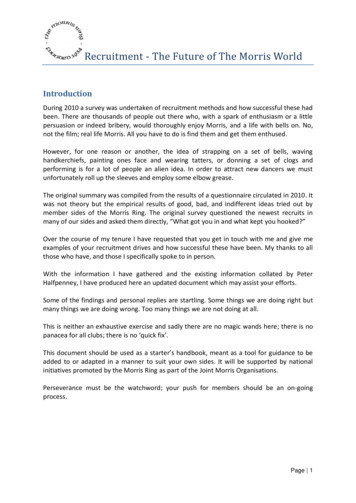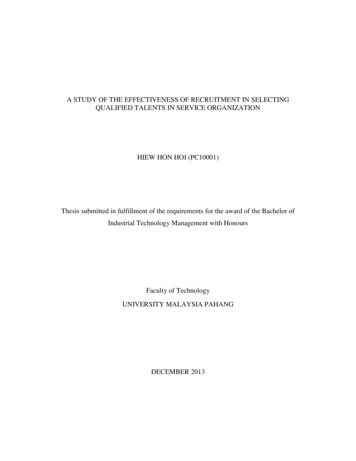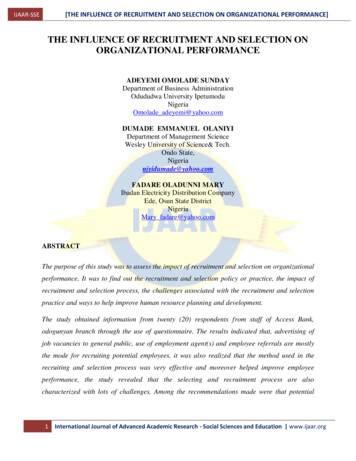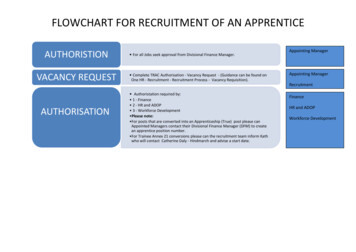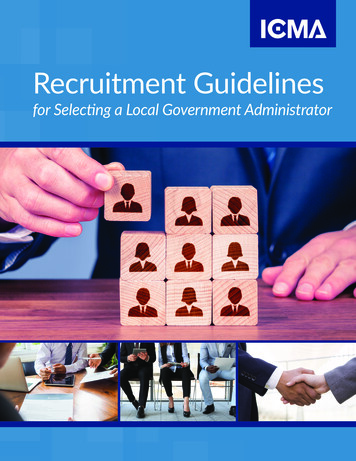
Transcription
Recruitment Guidelinesfor Selecting a Local Government Administrator
Recruitment Guidelines for Selecting aLocal Government Administrator 2012 by the International City/County Management Association. All rights reserved, including rights of reproduction and use in any form or by any means, including the making of copiesby any photographic process, or by any electrical or mechanical device, printed, written, or oralor recording for sound or visual reproduction, or for use in any knowledge or retrieval system ordevice, unless permission in writing is obtained from the copyright proprietor.About ICMAICMA advances professional local government worldwide. Its mission is to create excellence inlocal governance by developing and advancing professional management of local government.ICMA, the International City/County Management Association, provides member support; publications, data, and information; peer and results-oriented assistance; and training and professional development to more than 9,000 city, town, and county experts and other individuals andorganizations throughout the world. The management decisions made by ICMA’s members affect185 million individuals living in thousands of communities, from small villages and towns to largemetropolitan areas.ICMA777 North Capitol Street, NESuite 500Washington, DC 20002-4201202-289-ICMA (4262)icma.orgRECRUITMENT GUIDELINES FOR SELECTING A LOCAL GOVERNMENT ADMINISTRATORiii
PrefaceThis Recruitment Guidelines for Selecting a Local Government Administrator was first published justover ten years ago. While a lot has changed in ten years, the basic process for selecting a chiefadministrator1 has remained substantially the same. It still requires careful planning, astute evaluation of candidates, and a clear understanding of the relationship between the governing body2and the chief administrator. In this edition, however, new focus has been given to the ICMA Codeof Ethics —the foundation of the local government management profession—and the emergenceof the Voluntary Credentialed Manager program.The Task Force on Recruitment Guidelines was formed in Fall 2010 and consisted of a verydiverse group of ICMA members (many of whom have served on the ICMA Executive Board),Range Riders (former local government practitioners), younger members of the local governmentmanagement profession, and representatives from executive search firms. From its only face-toface meeting at the 2010 ICMA Conference in San José, this Task Force embraced the challengeof updating the guidelines. Over the next several months, we formed work groups to focus onthree key elements of the process: recruitment, selection, and negotiation. After countless conference calls and emails, the new and improved Recruitment Guidelines for Selecting a Local Government Administrator emerged.The Task Force consisted of the following ICMA members:Jane Bais-DiSessaCity ManagerBerkley, MichiganTony DahlerbruchCity ManagerRolling Hills, CaliforniaBill BaldridgeExecutive Search CommitteeFormer City ManagerMichigan Municipal LeagueEd DaleyCity ManagerHopewell, VirginiaTroy BrownAssistant City ManagerLivermore, CaliforniaGarry BrumbackTown ManagerSouthington, ConnecticutCharlie BushCity AdministratorProsser, WashingtonMike CaseyPartnerManagement Partners, Inc.Cincinnati, OhioTim ErnsterCity ManagerSedona, ArizonaTom FountaineBorough ManagerState College, PennsylvaniaPeter HerlofskyFormer City AdministratorFarmington, MinnesotaKay JamesCity ManagerCanandaigua, New YorkDave KringsFormer County ManagerHamilton County, OhioPeoria County, Illinois1 Chief administrator refers to a manager, administrator, or executive of a local government.2 Governing body refers to the elected officers of a town, village, borough, township, city, county, or a legallyconstituted council of governments.ivRECRUITMENT GUIDELINES FOR SELECTING A LOCAL GOVERNMENT ADMINISTRATOR
Debra KuritaFormer Assistant City ManagerSan Bernardino, CaliforniaScot SimpsonCity AdministratorRiver Falls, WisconsinJuliana MallerDeputy City ManagerPark Ridge, IllinoisCharlene StevensCity AdministratorWillmar, MinnesotaBob MurrayPresidentBob Murray & AssociatesRoseville, CaliforniaLarry StevensCity ManagerEdmond, OklahomaAndy PedersonVillage ManagerBayside, WisconsinBill TaylorField Services ManagerMunicipal Association of South CarolinaColumbia, South CarolinaSheryl SculleyCity ManagerSan Antonio, TexasMichael Van MilligenCity ManagerDubuque, IowaWilliam SequinoTown ManagerEast Greenwich, Rhode IslandMelissa VossmerCity ManagerAngleton, TexasPaul SharonICMA Range Rider, FloridaFormer Town ManagerAshland, MassachusettsNorth Andover, MassachusettsMichael WillisGeneral ManagerShellharbour City CouncilNew South Wales, AustraliaSpecial appreciation is extended to Tom Fountaine for serving as the negotiation section chair;Peter Herlofsky, selection section chair; and Debra Kurita, recruitment section chair. DebraKurita deserves special recognition as she labored many hours converting writing styles and formats into one consistent, easy-to-read document. On behalf of ICMA, I am grateful for the activeengagement of each Task Force member. Special thanks to Jared Dailey of the ICMA staff, whoassisted in the overall coordination of the Task Force.It is the hope of the Task Force that this guidebook is promoted and distributed to thosewho are in the environment to hire a chief administrator for a community. To the governing bodyrepresentatives who use this guidebook, we thank you for your service to your communities andwish you every success in finding the professional local government manager to help you guideyour community to be the best it can be.In closing, it has been my privilege to have served as the chair of this Task Force.Bonnie SvrcekDeputy City ManagerLynchburg, VirginiaRECRUITMENT GUIDELINES FOR SELECTING A LOCAL GOVERNMENT ADMINISTRATORv
Contents1. Introduction12. Managing the Organization during Recruitment23. Initiating the Recruitment34. Conducting the Recruitment45. Key Elements of the Recruitment Framework666788Major Decision Point: Appointing an Interim Administrator . . . . . . . . . . . . . . . . . . . . . . . . . . . . . . . . . 2Interim Management: The Governing Body’s Role . . . . . . . . . . . . . . . . . . . . . . . . . . . . . . . . . . . . . . . . . 2In-House Expertise Method: Recruitments Conducted by the Local Government . . . . . . . . . . . . . . . 4Outside Expertise Method: Recruitments Conducted with an Outside Party . . . . . . . . . . . . . . . . . . . 4Hybrid Method: In-House in Conjunction with Outside Party . . . . . . . . . . . . . . . . . . . . . . . . . . . . . . . . 5Major Decision Point: Development of an Administrator Profile . . . . . . . . . . . . . . . . . . . . . . . . . . . . . .Decision Point: Community Engagement in Administrator Profile . . . . . . . . . . . . . . . . . . . . . . . . . . . .Major Decision Point: Administrator Compensation Schedule . . . . . . . . . . . . . . . . . . . . . . . . . . . . . . .Geographic Scope . . . . . . . . . . . . . . . . . . . . . . . . . . . . . . . . . . . . . . . . . . . . . . . . . . . . . . . . . . . . . . . . . . . . .Advertising and Outreach Strategies . . . . . . . . . . . . . . . . . . . . . . . . . . . . . . . . . . . . . . . . . . . . . . . . . . . . .6. Key Elements of the Application Process107. The Role of the Media in the Recruitment Process128. The Selection Process139. The Negotiation Process1710. The Transition Process1911. Conclusion20Appendix A. ICMA Code of Ethics with Guidelines21Appendix B. Recommendations for Inclusiveness in Hiring26Appendix C. ICMA Guidelines for Compensation27Appendix D. Professional Organizations for Posting and Filling Vacancies29Appendix E. Potential Interview Questions30Appendix F. Relations with Applicants—Do’s and Don’ts32Appendix G. ICMA Model Employment Agreement33Index40The Application Form . . . . . . . . . . . . . . . . . . . . . . . . . . . . . . . . . . . . . . . . . . . . . . . . . . . . . . . . . . . . . . . . 10The Local Government Information Packet . . . . . . . . . . . . . . . . . . . . . . . . . . . . . . . . . . . . . . . . . . . . . . 10Applicant Relations . . . . . . . . . . . . . . . . . . . . . . . . . . . . . . . . . . . . . . . . . . . . . . . . . . . . . . . . . . . . . . . . . . 10Reviewing the Applications . . . . . . . . . . . . . . . . . . . . . . . . . . . . . . . . . . . . . . . . . . . . . . . . . . . . . . . . . . . 13Major Decision Point: Determining the Candidates to Be Interviewed . . . . . . . . . . . . . . . . . . . . . . 13Interviewing the Candidates . . . . . . . . . . . . . . . . . . . . . . . . . . . . . . . . . . . . . . . . . . . . . . . . . . . . . . . . . . 14Major Decision Point: Making the Final Selection . . . . . . . . . . . . . . . . . . . . . . . . . . . . . . . . . . . . . . . . 16Preparation for Negotiation . . . . . . . . . . . . . . . . . . . . . . . . . . . . . . . . . . . . . . . . . . . . . . . . . . . . . . . . . . 17Major Decision Point: Negotiating Compensation . . . . . . . . . . . . . . . . . . . . . . . . . . . . . . . . . . . . . . . . 17Announcing the Selection . . . . . . . . . . . . . . . . . . . . . . . . . . . . . . . . . . . . . . . . . . . . . . . . . . . . . . . . . . . . 19Additional Elements . . . . . . . . . . . . . . . . . . . . . . . . . . . . . . . . . . . . . . . . . . . . . . . . . . . . . . . . . . . . . . . . . 19RECRUITMENT GUIDELINES FOR SELECTING A LOCAL GOVERNMENT ADMINISTRATORvii
1. Introduction“Thousands of decisions are made every day in cities, towns, and counties that determine our quality of life .Professional managers craft the plans and make the decisions that transform good communities into great ones.”—International City/County Management Association (ICMA)Selecting a chief administrator is perhaps the most important decisionthat elected local officials will make for their community.This guidebook was created by experienced, seasoned local government managers. It is designedto help elected officials, human resource professionals, local government staff, and professional executivesearch firms navigate the recruitment, selection, andnegotiation processes to find the individual who isbest suited to serve as the chief administrator. Thechief administrator is like an orchestra conductor,directing and managing a team of professional, administrative, and field staff while interpreting and workingtoward the goals and objectives of the community’selected officials.This guidebook offers best practices that will bemost meaningful to you and your community in selecting a chief administrator. Because all communities,governing bodies, and chief administrators are not thesame, this is not a “one size fits all” guidebook. Nevertheless, the local government managers who created this document are firmly committed to the ICMACode of Ethics, which is a non-negotiable foundationfor professional local government management, andstrongly recommends that the hiring governing bodyuse the Code of Ethics as a tool in its search for aprofessional local government manager. Herein, weexplain recruitment choices and the selection processes to fit the unique size, culture, and dynamicsof an individual community. Topics include provisionsfor interim management; the spectrum of resourcesavailable to assist in the recruiting process; applications, communications with applicants, and interviews;compensation; and transition. The appendices providethe ICMA Code of Ethics, ICMA Compensation Guidelines, a directory of professional organizations thatare likely places advertise for a chief administrator,potential interview questions, the do’s and don’ts ofapplicant relations, and the ICMA Model EmploymentAgreement. Using this guidebook can make recruiting and selecting a new chief administrator a positive,enjoyable, and unifying experience for you and yourcolleagues as elected officials.As you use this resource, you will see highlightedin the margins important points for selecting the bestindividual for the position.When faced with an upcoming or immediatevacancy in the chief administrator position, the governing body must quickly address the following questions: What should we do to ensure that the affairs of thelocal government are properly administered until anew chief administrator is selected and on board? How do we conduct a recruitment to fill the vacancy?The following material provides tips and guidelineson the processes that the governing body needs toemploy to successfully answer these questions. It identifies and discusses the key elements of managing theorganization between the time that one chief administrator departs and another arrives, as well as the majordecision points in conducting the recruitment, selection, and negotiation processes for appointing the newchief administrator.Professional local government managersare committed to Serving as stewards of representative democracy Practicing the highest standards of honesty and integrity in local governance, as expressed throughICMA’s Code of EthicsBuilding sustainable communities as a coreresponsibilityNetworking and exchanging knowledge and skillsacross international boundariesLifelong learning and professional developmentFinancial integrity and responsibility for management ofthe communityImplementing best management practices.RECRUITMENT GUIDELINES FOR SELECTING A LOCAL GOVERNMENT ADMINISTRATOR1
2. Managing the Organization during RecruitmentThe governing body must act thoughtfully anddeliberately in determining how to ensure thatthe operations of the local government are properlymanaged during the period before a permanent chiefadministrator is selected and on the job. When facedwith a vacancy in the chief administrator position, thegoverning body needs time to carefully consider thequalities, expertise, and experience it hopes to find in anew administrator and to use the agreed-upon criteria to develop the administrator profile. It then needssufficient time to recruit and select the best possiblesuccessor who meets these criteria. While that is happening, however, it is important that the governingbody identify a professional who will act as the chiefadministrator and properly manage local governmentoperations while the recruitment processis underway.Major Decision Point: Appointing anInterim AdministratorIf the vacancy is the result of a planned retirement, thegoverning body may consider asking the current administrator to continue leading the organization for a shortperiod of time on a contract basis. Alternatively, thegoverning body may elect to consult with the outgoingadministrator regarding possible staff members whocould fill this role.In some cases, the members of the governing bodymay agree that they have confidence in a specificstaff person. If there is an assistant administrator, forexample, the governing body may appoint that personas interim administrator. If this assistant will be considered for the permanent position, the appointment asinterim administrator will provide the elected officialswith an opportunity to observe firsthand how the assistant handles the job. Another option is to appoint anassistant or department director (who will notbe a candidate for the position); someone who ismature, seasoned, competent and respected byfellow employees.Should the governing body determine that there isno one on staff who it can or wants to appoint as theinterim administrator, it may decide to retain the services of a retired administrator or an administrator whois between jobs. State associations, municipal leagues,or ICMA Range Riders are resources for identifyingpotential interim administrators.2The governing body should publicly announce theappointment of the interim chief administrator. Regardless of who is appointed, it should be made clear toall local government officials and staff that the interimchief administrator is responsible for implementinggoverning body policy and overseeing operations. Itshould alsobe made clear that if the interim administrator is ultimately selected to fill the position permanently, it willbe because that person has proven to be the bestamong all the applicants.Interim Management:The Governing Body’s RoleObviously, the local government must continue to operate during the interim between the departure of thecurrent chief administrator and the appointment of thenew one. The governing body and interim managementteam should do whatever is necessary to make surethat important projects and service delivery continueto move forward. It is important to reiterate that thegoverning body has the responsibility to make it clear tothe staff and community that the interim administratoris in charge of the organization’s operations.The governing body should consider deferring newinitiatives, when possible, until the new administratoris appointed and on the job. After all, to ensure effective administrative leadership in the future, it is desirable that the new administrator be involved in as manypolicy decisions as possible. Just filling a vacant department director position, for example, is an opportunityfor the new administrator to begin building an administrative team. In fact, such an opportunity can be usedto pique the interest of potential applicants during therecruitment process.Although it is not desirable for the governing bodyto immerse itself in the administrative affairs of thelocal government, its members should be briefedabout current organizational problems and the statusof important projects before the current administrator leaves, if possible. In this way, the governing bodymay monitor progress on important matters, providedirection, and set priorities for the person selected asinterim administrator.RECRUITMENT GUIDELINES FOR SELECTING A LOCAL GOVERNMENT ADMINISTRATOR
3. Initiating the RecruitmentThe governing body should initiate the recruitmentprocess immediately after the official decision hasbeen made regarding resignation, retirement, or termination. Failure to do so can potentially generate rumorswithin the community by various interested partieswho may attempt to exert pressure on members toquickly fill the vacancy. The members of the governingbody must bear in mind that an impulsive response tothis pressure can be divisive for them and can damagetheir credibility. They must take charge of the recruitment: they must determine the process that will beused to recruit and select the best administrator, andmake that decision clear to all concerned.There may be a number of special circumstancesthat influence the approach and timing used to recruita new chief administrator. The following examples provide some tips for addressing those circumstances: Vacancy due to the chief administrator’s termination or resignation under pressure. If the positionis vacant because the former administrator wasterminated or forced to resign, neither the localgovernment nor the former administrator willbenefit from a public quarrel. It is far better for allconcerned to mutually decide on a timetable forthe administrator’s departure. If this departure ishandled professionally and in a mutually respectfulmanner, there is less likelihood for controversy andill will to arise around the issues of the separation.Further, and from a recruiting standpoint, handlinga difficult situation well will enhance the localgovernment’s image and thus its ability to attractquality applicants. Vacancy occurring prior to an election. Occasionally,a governing body will delay initiating the recruitment process because an election is pending. Buteven in the face of an election, it should prepare forthe process by developing the administrator profile(described in full later in this document) and determining how the recruitment will be conducted so asto reduce the time lapse between the departure ofone administrator and arrival of another. Vacancies due to newly adopted council-managerform of government. If the position is vacantbecause voters either just approved the formationof or adopted a change to the council-managerform of government, the beginning of the search fora new chief administrator will depend on when thechange becomes effective. Depending on the circumstances, it may be possible to have applicationson file by the time the new members of the governing body are sworn in. In any case, the recruitmentprocess should be initiated as soon as possible.RECRUITMENT GUIDELINES FOR SELECTING A LOCAL GOVERNMENT ADMINISTRATOR3
4. Conducting the RecruitmentThere are several major elements and decisionpoints in the recruitment process. This sectionof the handbook provides tips and guidelines for thegoverning body in determining the approach to use inthis part of the process.The governing body has three major choices forconducting the recruitment. It can: Conduct the recruitment in-house Retain an outside party to conduct the recruitment Use a hybrid approach and conduct the recruitment in conjunction with an outside party.In-House Expertise Method:Recruitments Conducted by theLocal GovernmentIf the governing body chooses to conduct the recruitment in-house, it should be with the understandingthat the task will be time-consuming and complex. Thegoverning body may also have to decide whether toconduct the process as a body, delegate the responsibility to the chairperson, or assign the task to acommittee of its members. If it elects to delegate theresponsibility to one or more of its members, it mustbe sure to select people who are well respected andhave the time to provide the necessary leadershipand follow-through.To provide support in the process, the governingbody should seek the assistance of the local government’s human resources officer and municipal attorney. In conducting the recruitment in-house, staffcan work with the governing body to develop theadministrator profile and design an effective and legalrecruitment and selection process. Staff can also beresponsible for the administrative tasks of placingadvertisements, collecting résumés, and schedulinginterviews. However, the governing body or its delegated members will approve the selection of the finalcandidates and conduct the interviews, and, of course,the body as a whole will make the final selection. Inthis scenario, staff serve as a resource throughout theentire recruitment process.4Outside Expertise Method:Recruitments Conducted with anOutside PartyThe governing body can retain an outside party toconduct the recruitment. In some cases the interim ora retired administrator may be asked to coordinate therecruitment process. More often, however, the governing body will contract with a firm that specializes inproviding executive search assistance.When using an executive search firm, the governing body plays an active role in the process. It develops the administrator profile, approves the selectionof the applicants, interviews the candidates, and, ofcourse, makes the final selection. The benefit of usingan executive search firm is the expertise that the firmbrings to the process and its ability to coordinatethe recruitment.Typically the executive search firm begins bymeeting with the elected officials either individuallyor as a group to help them develop the administratorprofile. It is the firm’s responsibility to facilitate thesediscussions and help the governing body reach aconsensus. After this matter has been settled, the firmcoordinates the overall process and assumes responsibility for all tasks until it is time for the elected bodyto select and interview candidates. During this process, the firm updates the governing body, keepingthe members informed of its progress. As the firm willbe responsible for all the administrative details, therole of the staff is usually limited to providing information about the local government and coordinatingwith the firm.Governing bodies that use an outside serviceshould ensure that a reputable firm, one familiar withthe special requirements of local government management, is selected. The experience of the firm should bechecked through contact with references—in particular, representatives of local governments that haveused its services. Further, the governing body shouldbe fully aware of the costs and benefits when decidingwhether to use outside expertise.RECRUITMENT GUIDELINES FOR SELECTING A LOCAL GOVERNMENT ADMINISTRATOR
Hybrid Method: In-House inConjunction with Outside PartyIn the third alternative, the governing body can conduct the recruitment in-house and supplement theprocess, where necessary, with assistance from anexecutive search firm or another outside source, suchas an the ICMA Range Rider.In some cases, the governing body may seekassistance at the beginning of the process to facilitatethe discussion, develop the administrator profile, anddetermine the structure of the recruitment process.In other cases, local government officials may initiatethe process in-house by developing the profile andadvertising for the vacancy, and they may then usean outside source to help review résumés, conductreference checks, and structure the interview process. This alternative may be most appropriate ifcost is a concern; however, because it also presentsopportunities for lapses in communication, the exactresponsibilities of each party must be clarified in awritten agreement.RECRUITMENT GUIDELINES FOR SELECTING A LOCAL GOVERNMENT ADMINISTRATOR5
5. Key Elements of the Recruitment FrameworkRegardless of the method chosen for conductingthe recruitment, the governing body must developa framework for the recruitment process. It must agreeat the outset on a number of key issues critical to thesuccess of the recruitment, including criteria for theadministrator profile, compensation range and components, and timing and geographic scope of the search.Major Decision Point: Development ofan Administrator ProfileThe most significant decision point for the governingbody in the recruitment of a new administrator is todefine what the members are looking for—that is, tocreate the administrator profile. The profile will encompass those qualities, characteristics, experience, andareas of expertise that would be found in an ideal candidate. Only by considering how applicants compare andmeasure against one another and, of course, against theestablished criteria, can the governing body be sure thatthe candidate it appoints has the appropriate combination of work experience, management experience, andleadership style to be successful in the position.The governing body should begin with a surveyof its needs and those of the organization. To determine the needs of the organization, the governingbody should invite input from the department directors. Items to be considered include size of the localgovernment, composition of the community, servicesprovided, and overall objectives and priorities of thegoverning body. The work experience, skills, and expertise of the candidates must relate to these factors. Thegoverning body should also consider both the “nutsand-bolts” skills and abilities, such as budgeting, humanresources, and technological know-how, and the “soft”skills, such as the ability to work with people and tolead an organization. These criteria will form the basisfor reviewing résumés, selecting finalists, and making ahiring decision.Unless the governing body can come to consensuson these criteria, it may be difficult to find the rightcandidate. By reaching consensus, however, the governing body will be better able to inform the applicantson what it is looking for in a chief administrator.Developing the administrator profile helps thegoverning body define its needs and establishes thegroundwork for generating a rich pool of applicants6The ICMA Voluntary Credentialing Programrecognizes professional local governmentmanagers qualified by a combination of educationand experience, adherence to high standardsof integrity, and an assessed commitment tolifelong learning and professional development.For more information, th the skills and abilities to address the needs of thegoverning body, the community, and the organization.Decision Point: CommunityEngagement in Administrator ProfileThe governing body must decide whether to engagecommunity members or committees in the recruitmentprocess. In most cases, the local government assumesresponsibility for the recruitment and conducts the process without involving members of the community.In some cases, however, a governing body may seekinput from community members or committees whendeveloping the administrator profile. This not onlyallows the community to be part of the process but alsomay provide the governing body with a better understanding of the role of the administrator. Depending onthe method that the governing body uses to conductthe recruitment, gathering input from the communitywould be facilitated by staff, the outside recruiter, orthe elected officials.Although community input will be valuable, the governing body will ultimately determine the qualities andexperiences to be incorporated into the administratorprofile, and this should be clearly communicated to thecommunity. It is, after all, to the governing body thatthe new administrator will be directly reporting.Major Decision Point:Administrator CompensationAnother critical element to be considered at the outsetof the recruitment process is administrator compensation. It is important for the local government to haveRECRUITMENT GUIDELINES FOR SELECTING A LOCAL GOVERNMENT ADMINISTRATOR
Governing bodies need to be very alert to the dangers of either hiring a clone of the outgoingadministrator, assuming that person is leaving on good terms, or a polar opposite, assuming that personis leaving on less than good terms. The importance of evaluating the current needs of the governingbody and locality cannot be overstated.some general
Professional managers craft the plans and make the decisions that transform good communities into great ones." —International City/County Management Association (ICMA) Selecting a chief administrator is perhaps the most important decision that elected local officials will make for their community. This guidebook was created by experienced, sea-
